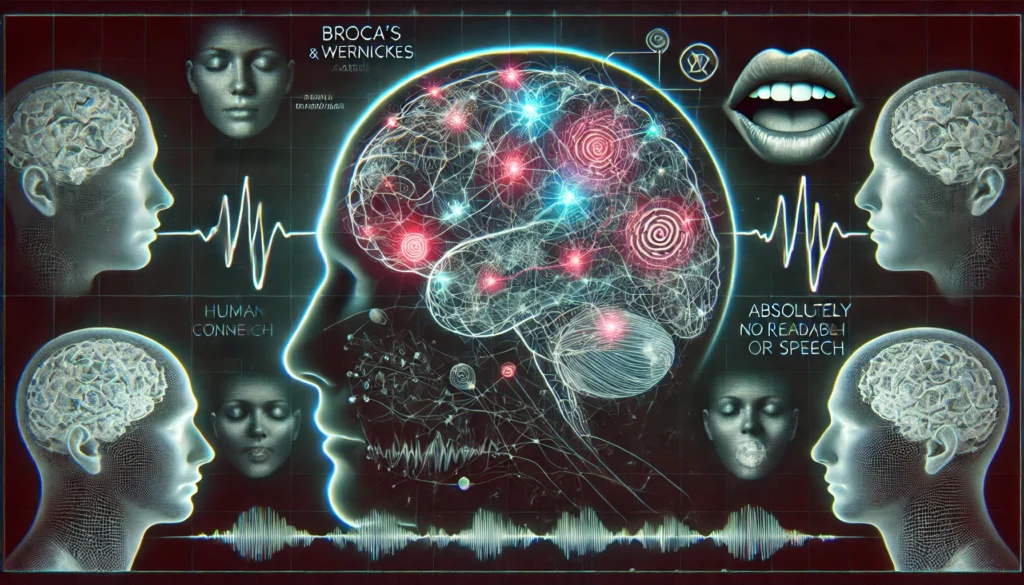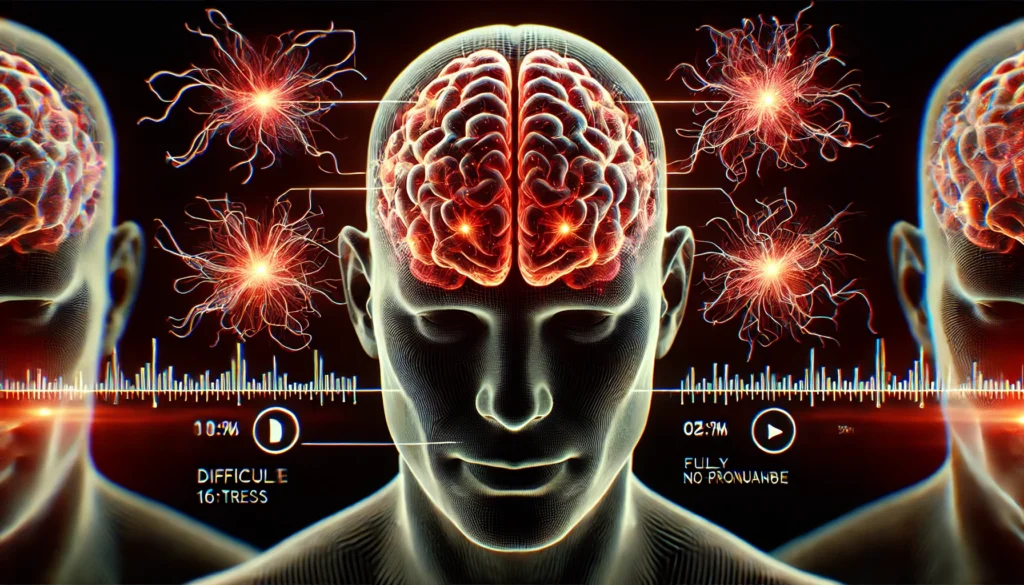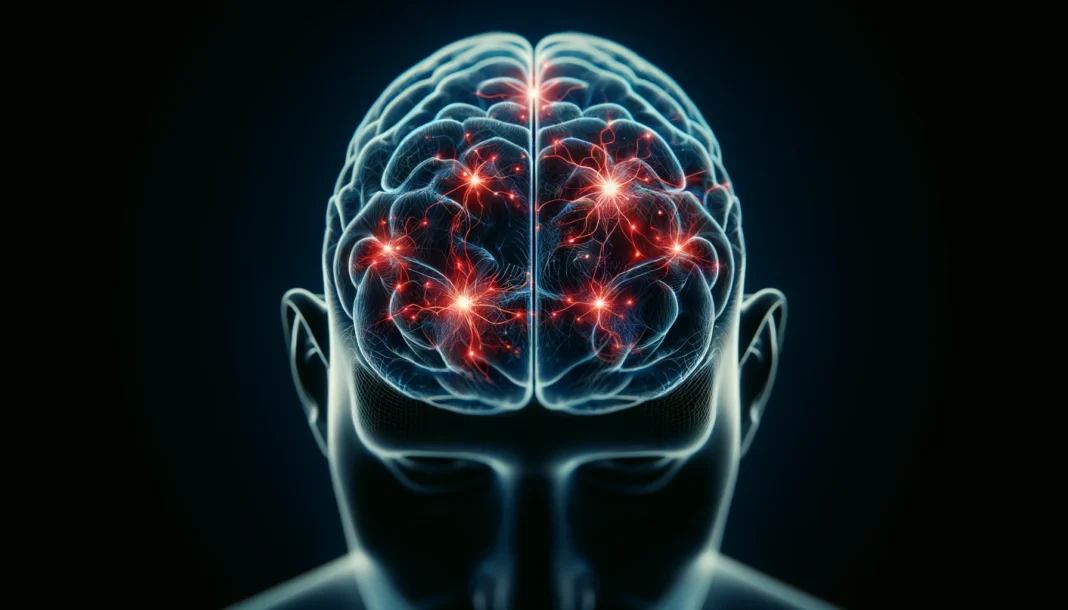Introduction
Dementia is a broad term that describes a decline in cognitive function severe enough to interfere with daily life. It’s a condition that affects memory, thinking, behavior, and language. While most people associate dementia with memory loss, recent research reveals that early warning signs may appear subtly and unexpectedly, particularly in how we use language. One emerging area of scientific interest is the mispronunciation of everyday words—something many might dismiss as a harmless slip. However, growing evidence suggests that struggling with certain commonly used terms could signal the earliest phases of cognitive decline.
You may also like: How to Stop Cognitive Decline: Science-Backed Steps for Prevention and Brain Longevity
Researchers have begun to pinpoint specific language patterns and verbal hiccups that may appear years before a formal dementia diagnosis. These include difficulty retrieving words, substituting incorrect words, and increasingly, mispronouncing familiar words. While a single instance of a mispronunciation isn’t alarming, consistent patterns—especially involving the same types of words—could raise a red flag. So, what are the 5 words you mispronounce before dementia becomes noticeable? And is mispronouncing words a sign of dementia in its early stages? In this article, we explore the scientific findings, expert opinions, and why mixing up words and forgetfulness may be more connected than you think.

The Language-Brain Connection: How Dementia Affects Speech
The human brain is a language powerhouse, involving several regions working together to enable speech, comprehension, and memory retrieval. The temporal lobe, especially the left side, houses Wernicke’s area, responsible for understanding language. The frontal lobe—particularly Broca’s area—handles speech production. When dementia begins to impact these areas, changes in verbal communication are often among the first symptoms to emerge.
Mispronouncing words dementia patients once used fluently is not uncommon. These language disruptions can begin subtly, such as hesitating before saying a word, choosing simpler vocabulary, or substituting similar-sounding words that are incorrect. Over time, more pronounced errors like slurring, incorrect syllable emphasis, or saying completely unrelated words may appear. What makes this particularly troubling is that many of these signs can go unnoticed or be attributed to stress, fatigue, or aging, making early detection difficult without professional assessment.
A frequently observed precursor in dementia patients is the consistent misuse or mispronunciation of certain types of words—especially abstract nouns, time-related terms, or even the names of familiar objects. This is where the question arises: are there actually five words you pronounce wrong before dementia is diagnosed? And if so, how reliable are these markers?

What Are the 5 Words You Mispronounce Before Dementia?
Scientific literature and anecdotal clinical evidence increasingly suggest that there may be a specific group of words that people commonly mispronounce in the early stages of cognitive decline. These are not random words, but ones that are tied to daily life, frequently used in conversation, and cognitively demanding in terms of pronunciation or mental association.
Though not standardized in every clinical practice, neurologists and neuropsychologists have noted patterns in words like “statistician,” “anemone,” “February,” “specific,” and “entrepreneur” being consistently mispronounced by patients later diagnosed with early-stage dementia. These five words you pronounce wrong before dementia are of interest not just because they’re tricky, but because of the way the brain handles phonetic complexity and memory retrieval.
Mispronunciation here doesn’t only mean saying the word incorrectly once. It refers to repeated misarticulation or phonetic breakdowns that signal underlying neurological changes. When combined with other signs—such as mixing up words and forgetfulness—these slips can become part of a broader diagnostic framework for clinicians.
These five words you mispronounce before dementia aren’t diagnostic in themselves, but they may act as cognitive markers when observed alongside other symptoms. For instance, when someone frequently stumbles over these words in a fluent conversation, fails to self-correct, or becomes visibly confused when asked to repeat them, clinicians may consider it a potential indicator of early cognitive impairment.
Is Mispronouncing Words a Sign of Dementia?
Many wonder: is mispronouncing words a sign of dementia, or just a common mistake everyone makes from time to time? The answer lies in context, frequency, and consistency. Occasional mispronunciations happen to everyone, especially with complex or unfamiliar words. However, when these errors become persistent, involve familiar terms, and are accompanied by other cognitive changes—like forgetfulness or difficulty following conversations—it may suggest something deeper.
Dementia-related mispronunciation is usually not isolated. It’s often part of a cluster of symptoms that include slowed speech, grammatical errors, trouble understanding sentences, and reduced vocabulary. These language disruptions are especially notable in frontotemporal dementia and Alzheimer’s disease, both of which can impair the brain’s language centers early in progression.
Furthermore, studies indicate that linguistic changes, such as substituting words, struggling with verb tenses, or oddly repeating phrases, often precede more recognized signs like memory loss. This is where the connection between mispronouncing words and dementia becomes clearer. Patients might say “pacific” instead of “specific,” or “Febuary” instead of “February,” and show frustration or confusion when corrected—highlighting not just a pronunciation issue but a cognitive struggle in processing the correct form.
Ultimately, it’s not about a single slip-up. It’s about patterns. Consistently mispronouncing the same terms—especially the five words you pronounce wrong before dementia is commonly diagnosed—could be a silent cry from a brain under stress.

The Science Behind Mixing Up Words and Forgetfulness
Language and memory are closely linked. The brain retrieves words much like it retrieves memories—through association, context, and neural pathways. When these pathways start to break down, the brain struggles not just to find the right word but also to articulate it properly. This overlap explains why mixing up words and forgetfulness often go hand-in-hand in dementia.
Neuroimaging studies have shown that patients with early Alzheimer’s demonstrate reduced activity in the left temporal and parietal lobes during language tasks. These regions are essential for phonological processing (how words sound) and semantic processing (what words mean). As these areas deteriorate, the ability to accurately pronounce and select the correct word diminishes.
This connection reinforces why the five words you mispronounce before dementia tend to be complex or phonetically challenging. These words demand more brainpower to pronounce correctly, and when the cognitive system falters, they’re the first to go. What’s more, when a person also starts mixing up everyday terms, forgets names, or struggles to follow multi-step conversations, it builds a clinical case for further cognitive testing.
It’s important to remember that not all mixing up of words equals dementia. Fatigue, anxiety, and even certain medications can produce similar effects. However, when symptoms are progressive and persistent, they warrant medical attention.
What 3 Words Are Mispronounced Before Dementia?
While much focus is given to five common words, some research zeroes in on three particular words that frequently trip people up in the early phases of cognitive impairment. These are typically words that involve multiple syllables, irregular spelling patterns, or foreign language roots. Examples might include “entrepreneur,” “anemone,” and “specific.”
These terms are considered valuable linguistic stress tests by neuropsychologists. Asking someone to pronounce them correctly—especially in a rapid succession or conversational context—can reveal subtle breakdowns in articulation and processing. These three words you mispronounce before dementia are not inherently diagnostic, but they serve as red flags when evaluated alongside other cognitive symptoms.
As with any cognitive screening tool, the purpose isn’t to diagnose based on one answer but to identify broader patterns of dysfunction. Therefore, these commonly mispronounced terms serve as early data points in a growing toolkit used by clinicians to catch dementia before it becomes clinically evident.

Cognitive Screening Tools and Verbal Memory Tests
In clinical practice, speech and language assessments are critical components of cognitive screening. These include tasks that test verbal fluency, repetition, naming, reading comprehension, and pronunciation. For instance, the Mini-Mental State Examination (MMSE) includes components that test verbal repetition and command following—functions that often deteriorate in dementia.
When patients exhibit difficulty repeating phrases, mispronounce common terms, or struggle with syntax, clinicians may order more in-depth tests such as the Montreal Cognitive Assessment (MoCA). These tools help to quantify language disruptions and correlate them with potential brain changes.
The emergence of digital diagnostics—apps and AI-based assessments—now allow for subtle language patterns to be analyzed in real time. Voice recognition software can detect small but significant shifts in pitch, timing, and articulation, providing early insight into verbal changes that may indicate cognitive decline.
Interestingly, some clinicians have started using lists like “the five words you pronounce wrong before dementia” as informal screening tools during early evaluations. While not yet standardized, they are gaining traction as red flag indicators that warrant further neurological assessment.
Five Words You Mispronounce Before Dementia: A Closer Look
Let’s take a deeper look at the five words you mispronounce before dementia becomes a clinical concern. These words are not arbitrarily chosen. They are often linguistically complex and cognitively demanding.
- Entrepreneur: A word borrowed from French, with irregular spelling and pronunciation, it challenges even healthy brains. Mispronunciations like “on-tre-panure” or “en-tra-preneer” could signal declining phonological accuracy.
- Anemone: Its repetitive syllables and unusual letter arrangement make it prone to mispronunciation. Saying “an-en-ome” or “ah-ne-mo-nee” instead of the correct “uh-NEM-uh-nee” can point to phonetic confusion.
- February: Skipping the first “r” (as in “Febuary”) is common, but if someone who used to pronounce it correctly begins to stumble, that regression might be notable.
- Specific: Saying “pacific” or “spacific” instead could signal an emerging problem with speech sound discrimination, common in cognitive decline.
- Statistician: The multi-syllabic structure and uncommon suffix make it difficult for people with early language impairment, often resulting in simplified or incorrect versions.
Again, occasional slip-ups aren’t concerning. But consistent errors, combined with other issues like memory lapses or mixing up words and forgetfulness, merit further evaluation.
When to Be Concerned: Mispronunciation vs. Normal Aging
It’s important to differentiate between normal age-related changes in speech and those that could be symptomatic of cognitive disorders. As we age, it’s normal to occasionally struggle to find the right word or mispronounce something under stress. However, when language errors are frequent, persistent, and accompanied by cognitive changes—such as difficulty organizing thoughts, forgetting appointments, or losing track of conversations—they may signal something more serious.
Families often notice these changes before the individual does. It’s common for loved ones to report that someone “doesn’t sound like themselves anymore” or has become hesitant when speaking. These shifts in verbal confidence and fluency can be some of the earliest—and most distressing—signs that warrant a neurological evaluation.
Frequently Asked Questions
1. What are the five words you pronounce wrong before dementia?
The five words you pronounce wrong before dementia often include linguistically complex or phonetically difficult terms such as “entrepreneur,” “anemone,” “February,” “specific,” and “statistician.” These words challenge cognitive and speech-processing areas of the brain. Persistent mispronunciation of these words—especially when the person previously had no trouble—may be an early sign of cognitive decline.
2. Is mispronouncing words a sign of dementia?
Yes, mispronouncing words can be an early sign of dementia, particularly when it occurs frequently, involves familiar words, and coincides with other cognitive symptoms. While occasional slips are normal, consistent errors, difficulty self-correcting, and increased confusion when speaking should prompt a cognitive screening evaluation.
3. How is mixing up words and forgetfulness connected?
Mixing up words and forgetfulness both stem from issues in brain regions responsible for memory, language, and processing. As dementia affects these areas, the brain has a harder time retrieving and articulating the correct word, often resulting in substitutions, pauses, or mispronunciations. These symptoms frequently appear together in early stages of cognitive decline.
4. What 3 words are mispronounced before dementia?
Commonly mispronounced words in early dementia include “entrepreneur,” “specific,” and “anemone.” These words require complex phonological processing, and repeated mistakes in pronouncing them—especially in someone who once used them correctly—may be a subtle sign of early cognitive impairment.
5. Can mispronouncing words indicate other health issues besides dementia?
Yes, other conditions such as stroke, traumatic brain injury, and certain neurological disorders can also affect speech and lead to mispronunciations. Mental fatigue, stress, and medication side effects can also contribute. However, persistent and progressive mispronunciation is a red flag that should be evaluated.
6. Are there diagnostic tools that test for mispronounced words?
There is no formal diagnostic tool solely based on word mispronunciation, but cognitive assessments like the MoCA and MMSE include language components. Some practitioners use word lists or conversational tests to evaluate pronunciation, verbal fluency, and naming ability as part of a broader screening process.
7. Why are these specific five words significant?
These five words—entrepreneur, anemone, February, specific, statistician—are commonly used, phonetically complex, and require accurate memory retrieval. Their mispronunciation can expose phonological and cognitive breakdowns associated with early dementia, making them useful informal indicators in clinical contexts.
8. Is it normal to forget or mispronounce words as we age?
Occasionally, yes. Normal aging can result in slower word retrieval or minor pronunciation errors. The concern arises when these issues increase in frequency, involve familiar words, and interfere with daily communication, which may indicate early cognitive decline or dementia.
9. What should I do if I notice someone consistently mispronouncing these words?
If you notice persistent language changes in someone, especially when combined with forgetfulness, confusion, or personality changes, it’s important to consult a healthcare professional. Early intervention and cognitive screening can help identify underlying causes and improve outcomes.
10. Can speech therapy help if someone is mispronouncing words due to dementia?
Yes, speech-language pathologists can provide targeted therapy to improve verbal communication, word retrieval, and pronunciation. While therapy may not reverse cognitive decline, it can enhance quality of life, slow symptom progression, and support daily communication.

Conclusion
Language is more than a tool for communication—it’s a mirror of our cognitive health. As research continues to reveal how early dementia impacts speech, it becomes increasingly clear that verbal slips, especially those involving familiar yet complex words, are more than just quirks. They can be the first whisper of something deeper going on in the brain. Understanding the five words you pronounce wrong before dementia, and recognizing how mixing up words and forgetfulness intertwine, empowers individuals and families to seek help early.
While no single symptom guarantees a diagnosis, repeated mispronunciations—especially of words like “entrepreneur” or “specific”—should not be ignored. If these signs are accompanied by memory problems, confusion, or changes in behavior, professional evaluation is crucial. As science advances, our ability to catch dementia in its earliest stages improves, and with it, the potential to intervene meaningfully. Stay informed, stay observant, and trust the quiet signals your words may be sending.
Was this article helpful? Don’t let it stop with you. Share it right now with someone who needs to see it—whether it’s a friend, a colleague, or your whole network. And if staying ahead on this topic matters to you, subscribe to this publication for the most up-to-date information. You’ll get the latest insights delivered straight to you—no searching, no missing out.
Further Reading:
Early Signs of Dementia You Should Never Ignore in Parents and Grandparents
Understanding Neurocognitive Problems and the Types of Cognitive Disorders That Affect Brain Health



